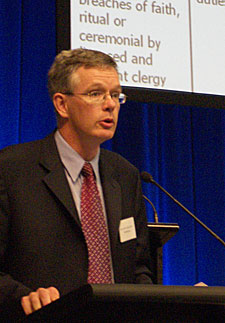 The Sydney Diocese has an official grievance policy and procedure after Synod members gave their approval on the final night of Synod last week.
The Sydney Diocese has an official grievance policy and procedure after Synod members gave their approval on the final night of Synod last week.
The policy deals with allegations of unacceptable behaviour by clergy and church workers that involve bullying, harassment and emotional, physical or spiritual abuse. Issues such as sexual abuse, child abuse, professional misconduct or criminal activities are not included, as these are addressed under other diocesan legislation such as the Discipline Ordinance.
There are three levels to the conciliation process: the first involves direct resolution between the parties involved, the second has conciliation at a local level (with the senior minister or another appropriate person acting as conciliator), and the third involves the regional bishop. A support person would be allowed to accompany the complainant to any conciliation process, although they would be unable to take part in discussions.
Canon Sandy Grant, who moved the approval of the policy and procedure, said he believed it "should help provide a way of addressing complaints about unacceptable conduct in a way that upholds the highest standards for church leaders, and also attempts to be fair and impartial".
Issues raised on the floor of Synod included whether or not clergy could make complaints as the alleged victim (which they can), as well as concerns about the policy's requirement that a complainant have no legal representation.
The diocesan secretary, Robert Wicks, explained that the legal question had been considered carefully but "the intention here is really a low-level way of trying to achieve reconciliation before things get serious".
The director of the Professional Standards Unit, Glenn Murray, observed that grievances under the policy "were designed to be settled under Scriptural principles". Canon Grant agreed, saying there was no barrier to a person getting legal advice before a conciliation process began, but the intent was for the policy to be a confidential and "non-legal" alternative.
The policy and procedure will take effect from July 1 next year. Standing Committee will have the task of selecting an appropriate pool of people to be conciliators for complaints that reach the regional level. It will also undertake a review of the policy and procedure in three years' time.




















